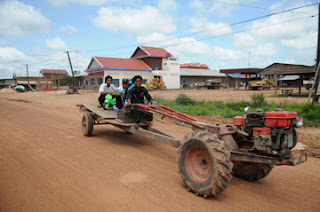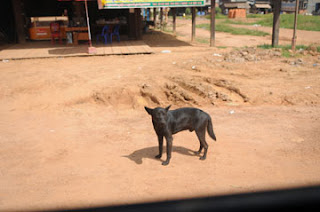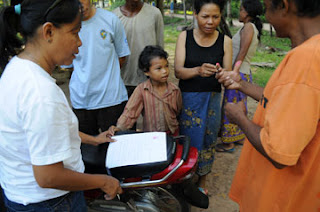



My "plan" called for me to spend a day at the temples, but I found it hard to resist Ponheary’s alternative offer: a ride into the countryside with her family to an area close to the Thai border, about 118 km away. She promised adventure, good times, and all the rice fields I could handle. I was in love with the proposition. Until the moment, that is, the moment I saw the minivan we were all supposed to fit into.
 In no time, we were off. Here I was, a lone American mixed among 12 Cambodians, packed in a van, and riding into the countryside. It turned out, though, that Ponheary is a great influence on the family. She speaks English, as do her brother Dara and a family friend who joined us for the trip. Dara’s children attend an all-English school, the Cambodian equivalent of private school in America, to the tune of $50 each per month. To a Cambodian, with an average income around $200 per year, a $150 per month expense is proportionately huge. We talked about it; he is not rich, so how could he afford that? He works as a guide, one of the best-playing professions in Siem Reap. “After I pay their school, there is not much left,” he said, continuing after some thought, “They are my bank.”
In no time, we were off. Here I was, a lone American mixed among 12 Cambodians, packed in a van, and riding into the countryside. It turned out, though, that Ponheary is a great influence on the family. She speaks English, as do her brother Dara and a family friend who joined us for the trip. Dara’s children attend an all-English school, the Cambodian equivalent of private school in America, to the tune of $50 each per month. To a Cambodian, with an average income around $200 per year, a $150 per month expense is proportionately huge. We talked about it; he is not rich, so how could he afford that? He works as a guide, one of the best-playing professions in Siem Reap. “After I pay their school, there is not much left,” he said, continuing after some thought, “They are my bank.”Our day’s mission was to purchase a tractor for her cousin (who has a large farm) and to look at a small farm that was for sale near the Thai border. Both farms were in Kampuchea Province, most renowned for being the home of the Khmer Rouge. We passed the home of the deceased Pol Pot, the Khmer Rouge’s leader, along the way. It was difficult to see from the road and we did not stop, although lots of finger-pointing and chit-chat was noticeable inside the van as we passed. To this day, Kampuchea has the highest concentration of former Khmer Rouge soldiers. Ponheary is not concerned, but must have seen the look of concern on mine. She whispered in my ear, “It’s OK, they have forgotten how to kill.” We made a very notable stop, that taught me more about Ponheary and the work her foundation does.
 Our most notable stop, aside from the farmhouse itself, was a village family's house. Among her may humanitarian efforts, one thing Ponheary Ly does with her foundation is give people no-interest microfinance loans. She will give $200, $300, or $400 to a family to help them get the things they need. There is a catch. She has to know how they will spend the money, and requires the loanee to devise a plan for how the money will be used to increase the family's wealth and not just satisfy the immediate problem. And, they have to promise to repay the original amount of the loan. Ponheary does not charge interest, because her goal is merely to help people off their feet. She used to just give the money away, but found that the people never got any better off, and instead continued relying on her financial gifts. Now, taking a loan from Ponheary has to be part of a bigger plan to get yourself out of the hole you're in. She drafts a handwritten contract that parties sign in Khmer fashion--with their thumbprints.
Our most notable stop, aside from the farmhouse itself, was a village family's house. Among her may humanitarian efforts, one thing Ponheary Ly does with her foundation is give people no-interest microfinance loans. She will give $200, $300, or $400 to a family to help them get the things they need. There is a catch. She has to know how they will spend the money, and requires the loanee to devise a plan for how the money will be used to increase the family's wealth and not just satisfy the immediate problem. And, they have to promise to repay the original amount of the loan. Ponheary does not charge interest, because her goal is merely to help people off their feet. She used to just give the money away, but found that the people never got any better off, and instead continued relying on her financial gifts. Now, taking a loan from Ponheary has to be part of a bigger plan to get yourself out of the hole you're in. She drafts a handwritten contract that parties sign in Khmer fashion--with their thumbprints.
No comments:
Post a Comment